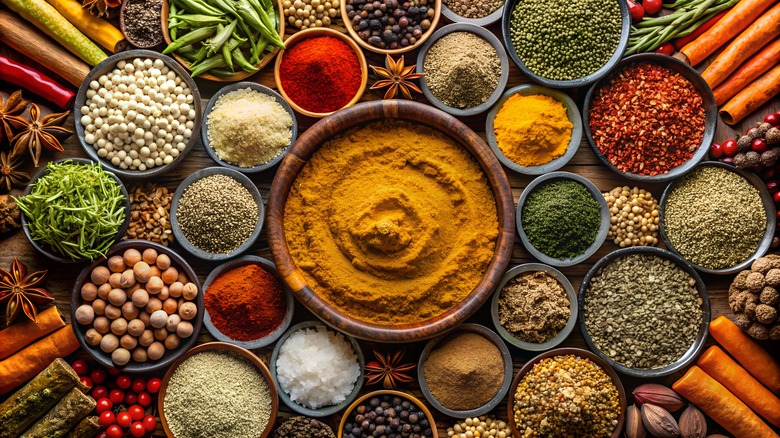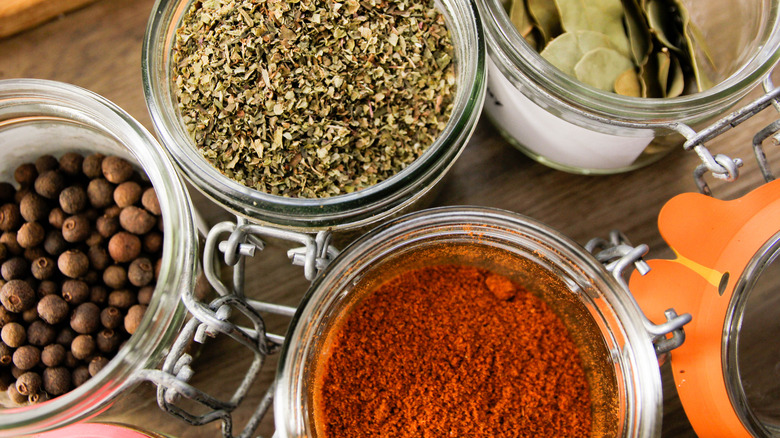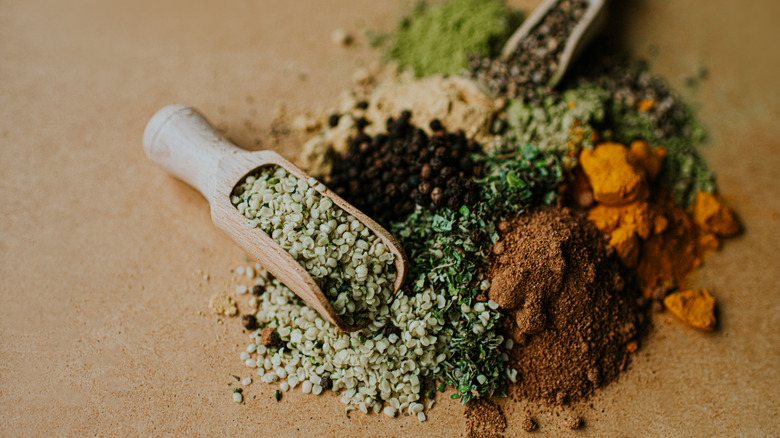Spice Vs Seasoning: Is There Really A Difference?
For good food to exist, the spice must flow. Be it simple black pepper or something more complex like cumin, smoked paprika, and mustard seed, you'll have a very hard time serving up something nice without spice. Just a pinch will be able to turn a dish from bland to grand in a jiffy. And spices aren't just for food either. Cocktail enthusiasts know that a dash of spice can bring certain drinks like the classic Bloody Mary to new heights.
Read enough recipes, however, and you'll find another word often popping up alongside spice, which is "seasoning." Think about how individual ingredients like nutmeg and cloves are always referred to as spices, but then we have something like "Italian seasoning." While many use the two terms interchangeably, there are actually some pretty big differences between spices and seasoning. Spices are individual ingredients from specific parts of plants — think roots, bark, fruits, or seeds. Seasoning, on the other hand, is a blend of spices, herbs, or flavoring ingredients.
Now, it's unlikely that anyone's going to call you out if you refer to cinnamon as a seasoning. No matter what you call spices and seasoning, they still do the same job, which is making your food (or drink) taste or smell better. But if you have a habit of writing down your recipes or like to look into new cuisine, knowing which category an ingredient belongs to can indeed be very useful.
Spices versus herbs
Let's start with spices. A classic example of a spice is black pepper, which is the dried berry of the pepper tree. Chili flakes and paprika? They're also spaces, made from chili plants. Some types of tree bark, like cinnamon, are also considered spices, and so are seeds such as cumin and cardamom. You can also throw fragrant roots like turmeric and ginger into the spice category with the rest of the lot, too.
Closely related to spices are herbs. Since they also come from plants, lots of people can get confused at this part. So, to clear it up: An herb is anything that comes from the flowering or greenish part of the plant, like stems and leaves. So, that sprig of rosemary in your roast chicken? It's an herb. The muddled mint leaves in your mojito? Also an herb. Even edible flowers like lavender that you'd use to flavor a Lavender Old Fashioned or dried chamomile to brew into a comforting pre-bed tea fall into this category.
Seasoning is a blend of spices or herbs
Seasoning is what you'd call a mixture of different flavors, including spices and herbs. Some people have also taken to calling them "spice blends" or "spice mixes." An example is Italian seasoning, which is a blend that usually includes ingredients like basil, oregano, rosemary, marjoram, and thyme and can give an herbal kick to anything you add it to, like a cheesy chicken parmesan spaghetti bake. Many cultures and corners of the world have a seasoning blend, like Cajun seasoning and Moroccan seasoning (Ras El Hanout.)
The term "seasoning" also covers flavor enhancers that aren't strictly spices or herbs. This includes substances like MSG, vinegar, sauces like sriracha, and cooking oil. Another good example of this is salt. Salt is not plant-derived and is a mineral. Since it can sound a bit strange to write "mineralize your steak with salt," most agree that it's a type of seasoning. You're probably no stranger to the phrase "season with salt and pepper," which can be found in many recipes. The word season is used in that context because you mesh salt and pepper together, and because salt is a seasoning rather than a spice.
In the end, though, you can use whichever phrasing you like. As long as you don't get confused and add the wrong thing to the dish, don't feel bad for writing "season with ground black pepper" — everyone's been there.


